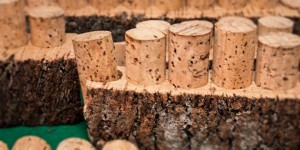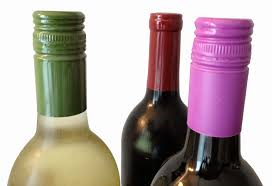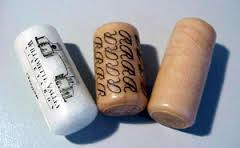To Cork or Not to Cork…..
That is the Question!
The lively debate of cork vs. synthetic vs. screw top closures is all around us! Vintners, Distributors, Farmers, Sommeliers, Consumers….everyone seems to have an opinion on the subject, and the reasons behind them are as varied as my wine group’s taste in Pinot Noirs. Here’s a quick rundown of the merits and drawbacks of different wine closures:
 Wine Corks: Tradition and Ritual
Wine Corks: Tradition and Ritual
Pros: Cork has a long history; it has been used as the sealing method of choice in winemaking for over 400 years. Cork is a renewable resource (the trees are not killed when the bark is stripped to make cork). They are natural and readily biodegradable. Cork production and use supports an entire industry of corkscrews and other cork-removal products, not to mention those who farm the trees and make the actual corks. Plus you have the style factor – proper wine service in a restaurant setting is a delightful experience, which may lose some of its magic with a screw cap.
Cons: Wine Corks go bad, more often than you may believe. Estimates vary depending on which figures you credit, but the fact is that as little as 1% or as much as 20% of all wine sold is “corked”, which is to say, damaged by a problematic cork. Wine corks can be difficult to remove, and sometimes break off into the bottle. Also, cork is not cheap. You’re paying upwards of $1 per bottle for that cork.
Pros: Synthetics are immune to cork taint, so wine is much less likely to spoil. Depending on the material used, some synthetics are recyclable. The same cork-removal equipment can be used (though personal experience tells me that synthetic closures can be stubborn to remove).
Cons: If not recycled, plastic corks also pose a more direct impact on the environment. The material may not retain its elasticity well over time, making it unsuitable for wines meant to age for an extended time.
Screw Caps: Quick and Dirty
 Pros: Screw caps, like synthetic closures, avoid problems of cork taint. They are less expensive than natural cork or synthetic closures, and they can be removed without any special equipment.
Pros: Screw caps, like synthetic closures, avoid problems of cork taint. They are less expensive than natural cork or synthetic closures, and they can be removed without any special equipment.
Cons: As with synthetics, screw caps imply environmental issues associated with the loss of cork farming as well as disposal (not all are recyclable). They are also not built for long aging wines. An important component of proper wine service includes the removal of the foil and cork, so your tableside show may seem a bit less grand without it.
So, we’ve touched a bit on the larger points of debate (by no means all of the issues involved).
What are your thoughts? Will that incredible Edna Valley Chardonnay lose some of its it’s luster with a synthetic closure? Is a natural cork a deal breaker for your Paso Robles Zinfandel? Or do you twist off the cap of your new vintage Rosé and say ‘”screw it!”?
xxoo
Robin



